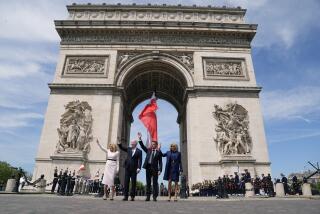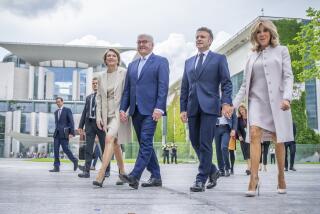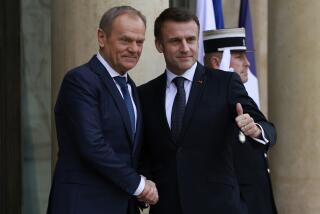Kohl’s Visit to Paris Marking 25 Years of Friendship for Old Foes
- Share via
PARIS — As a reminder of German brutality, the French have never rebuilt the ruins of the village of Oradour near Limoges in central France. In retaliation against French resistance during World War II, a German SS division executed all of the village’s 190 men by machine gun, rounded up 452 women and children into a church, burned it to the ground as they screamed inside, then razed the village.
Nor have the French forgotten Verdun, where between 600,000 and 1.25 million French and German soldiers were killed, wounded or missing after 10 months of fighting in 1916 during World War I. Verdun was one of the bloodiest battles in history, and its cemetery and monument still serve as a reminder to the French that they fought three terrible wars against their neighbors, the Germans, in less than 80 years, the third being the Franco-Prussian war of 1870-71.
Yet, despite the memories, the French now look on the Germans as their closest and most significant allies, and an elaborate ceremony is planned today when Chancellor Helmut Kohl of West Germany arrives in Paris to help commemorate the anniversary of the treaty of friendship signed by President Charles de Gaulle of France and Chancellor Konrad Adenauer of West Germany 25 years ago.
The transformation is so complete, in fact, that French officialdom, far from being concerned about any German propensity for brutality and war, now worries instead that West Germany has become too pacifist, too fearful of nuclear weaponry, too susceptible to the blandishments of Soviet leader Mikhail S. Gorbachev.
Although President Francois Mitterrand and Premier Jacques Chirac will devote much of their rhetoric during Kohl’s visit to praising close ties, the French leaders will also surely bring up the differences that are emerging on European defense.
France, convinced that nuclear deterrence is the only viable European defense in the foreseeable future, is skeptical of the latest Soviet proposal to eliminate nuclear missiles with a range of less than 300 miles. On the other hand, West Germany, fearful that the only battleground for such weapons would be West Germany and East Germany, seems ready at least to consider proposals that would eliminate the short-range missiles.
The Franco-German Treaty of Friendship and Cooperation was forged out of the prestige of the two elderly statesmen who signed it in Paris on Jan. 22, 1963. For the 86-year-old Adenauer, it represented the culmination of a long and arduous campaign to put West Germany firmly back into the family of Europe. The 72-year-old De Gaulle looked on the treaty as a building block in his plan to anchor West European defense on close relations between France and West Germany.
The treaty, however, was signed in some embarrassment. Just a week before, De Gaulle, who was to pull French military forces out of the command of the North Atlantic Treaty Organization three years later, announced that he was going to veto Britain’s application to the European Common Market. In light of what had just happened, U.S. officials looked on the treaty as an attempt by De Gaulle to weaken NATO and North Atlantic unity.
Adenauer brushed aside pleas that he renege on signing the treaty. But the German Bundestag ratified it only after adding a preamble saying that nothing in the treaty superseded West Germany’s commitments to NATO.
The treaty provides for an unusual amount of consultation to encourage the two countries to reach common positions on foreign affairs and defense policies. The leaders of France and West Germany, under these provisions, meet at least twice a year while their foreign ministers meet at least every three months.
The treaty has never persuaded France to put its troops back under NATO command, or West Germany to weaken its ties to NATO. But the unusual closeness that it encourages has sometimes troubled other Europeans. As Kohl put it in recently: “If French-German relations are good, our partners suspect us of trying to constitute a directorate. If our relations are not good, they accuse us of fleeing from our historic obligations.”
Today, Kohl and a delegation of Bonn Cabinet members will meet with Mitterrand, Chirac and French ministers before all attend a brief commemorative ceremony in the Salon Murat. New agreements will be signed setting up a French-German Council of Security and a French-German Financial and Economic Committee.
But the subtle differences over nuclear policy are sure to hang over much of today’s ceremonials. In recent weeks, the French, who rely on short-range nuclear missiles as a key element of their defense program, have said these must not be reduced until the Soviet Union agrees to eliminate its advantage in conventional forces in Europe. In this, the French view closely follows the NATO view.
The French do not accept the German concern that Germany would be the battleground if short-range missiles were used. They insist that their weapons would be aimed at the enemy.
Also, they believe that any nuclear weapon, no matter how small, cannot be a limited tactical weapon but must be considered part of a nuclear arsenal that could ignite all-out nuclear war. For this reason, according to the French, the potential danger of such weapons almost guarantees that they will not be used.
At the same time, the French have tried to reassure the Germans that the French would look on an invasion of West Germany as if it were an invasion of France. But it is obvious that many Germans find the concept of a denuclearized Europe attractive. The French, while celebrating the treaty anniversary, will be trying to turn around a new German mood.
More to Read
Sign up for Essential California
The most important California stories and recommendations in your inbox every morning.
You may occasionally receive promotional content from the Los Angeles Times.










